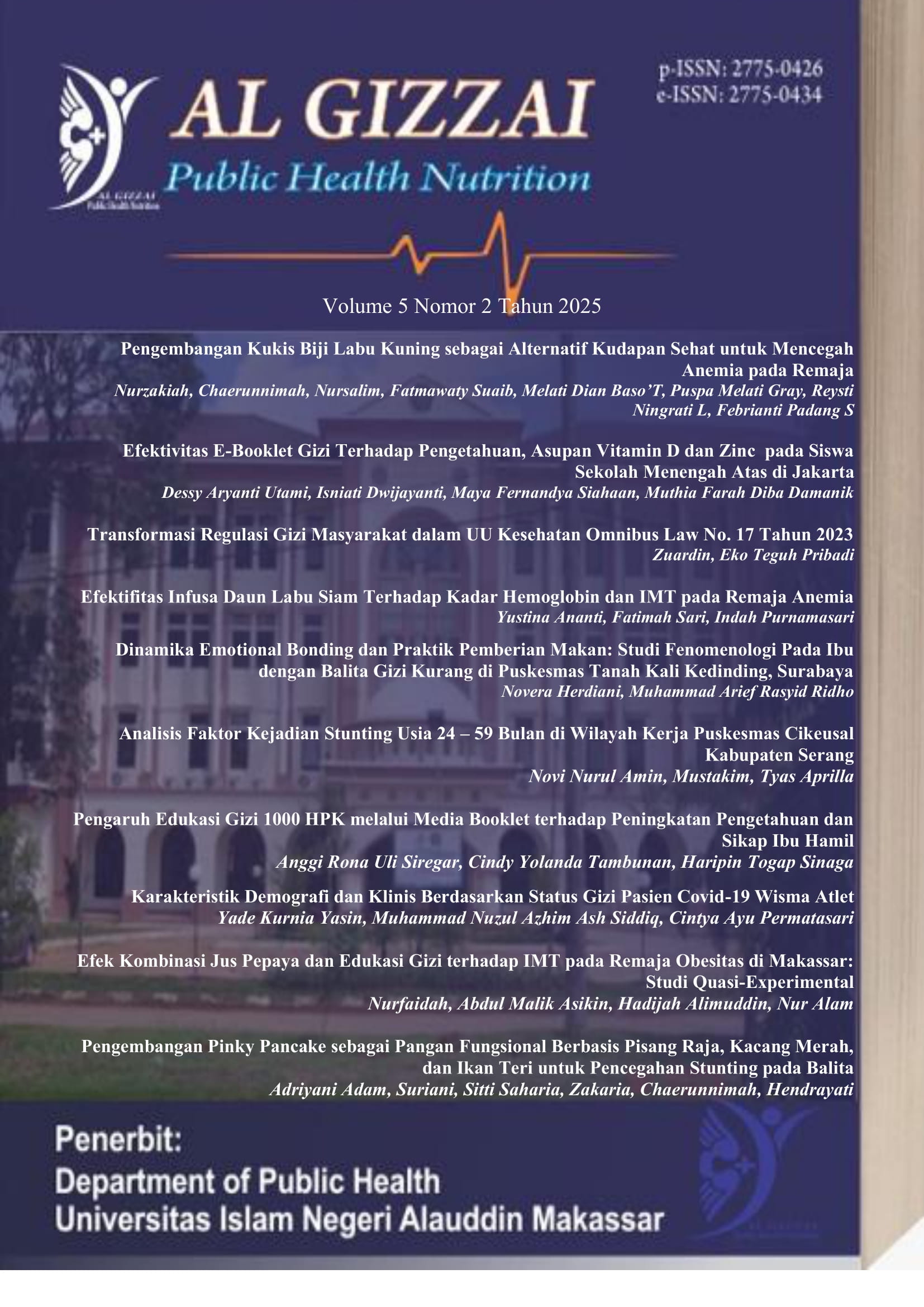Karakteristik Demografi dan Klinis Berdasarkan Status Gizi Pasien Covid-19 Wisma Atlet
DOI:
https://doi.org/10.24252/algizzai.v5i2.58613Keywords:
Covid-19, Status Gizi, Karakteristik Klinis, DemografiAbstract
Pendahuluan: Status gizi merupakan faktor penting yang memengaruhi perjalanan klinis infeksi Covid-19, termasuk keparahan gejala, durasi rawat inap, dan respons imun. Penelitian ini bertujuan untuk menganalisis karakteristik demografi dan klinis pasien Covid-19 berdasarkan status gizi di RSDC Wisma Atlet Kemayoran Jakarta.
Metodologi: Studi ini menggunakan desain cross-sectional dengan jumlah responden sebanyak 572 pasien rawat inap non-ICU selama Februari–Maret 2021. Data diperoleh melalui pengukuran antropometri, wawancara terstruktur, dan telaah rekam medis. Analisis dilakukan menggunakan uji Kruskal-Wallis dan Chi-square.
Hasil: Mayoritas pasien berada dalam kategori overweight (34,4%) dan obesitas (33,4%). Terdapat perbedaan signifikan dalam distribusi usia, jenis kelamin, riwayat komorbiditas, dan jenis diet rumah sakit antar kelompok status gizi (p<0,05). Namun, lama rawat inap, gejala awal, riwayat merokok, asupan makan, dan konsumsi cairan tidak menunjukkan perbedaan bermakna (p>0,05).
Kesimpulan: Pasien obesitas lebih sering mengalami hipertensi dan menerima diet rendah garam, sedangkan pasien underweight menerima diet tinggi energi dan protein. Temuan ini menegaskan bahwa status gizi berperan penting dalam membentuk profil demografi dan klinis pasien, serta perlu dipertimbangkan dalam perencanaan intervensi gizi dan manajemen klinis Covid-19.
References
Alimohamadi, Y., Yekta, E. M., Sepandi, M., Sharafoddin, M., Arshadi, M., & Hesari, E. (2022). Hospital length of stay for COVID-19 patients: A systematic review and meta-analysis. Multidisciplinary Respiratory Medicine, 17. https://doi.org/10.4081/MRM.2022.856
Antwi, J. (2023). Precision Nutrition to Improve Risk Factors of Obesity and Type 2 Diabetes. Current Nutrition Reports, 12, 679–694. https://doi.org/10.1007/S13668-023-00491-Y/TABLES/1
Barazzoni, R., Bischoff, S. C., Breda, J., Wickramasinghe, K., Krznaric, Z., Nitzan, D., Pirlich, M., & Singer, P. (2020). ESPEN expert statements and practical guidance for nutritional management of individuals with SARS-CoV-2 infection. Clinical Nutrition, 39(6), 1631–1638. https://doi.org/10.1016/j.clnu.2020.03.022
Caci, G., Albini, A., Malerba, M., Noonan, D. M., Pochetti, P., & Polosa, R. (2020). Covid-19 and obesity: Dangerous liaisons. Journal of Clinical Medicine, 9(8), 1–12. https://doi.org/10.3390/jcm9082511
Calder, P. C. (2020). Nutrition, immunity and COVID-19. BMJ Nutrition, Prevention & Health, 3(1), 74–92. https://doi.org/10.1136/bmjnph-2020-000085
CDC. (2023). Obesity, Race/Ethnicity, and COVID-19. Centers for Disease Control and Prevention. https://www.cdc.gov/obesity/data/obesity-and-covid-19.html
Espejo-Paeres, C., Núñez-Gil, I. J., Estrada, V., Fernández-Pérez, C., Uribe-Heredia, G., Cabré-Verdiell, C., Uribarri, A., Romero, R., García-Aguado, M., Fernández-Rozas, I., Becerra-Muñoz, V., Pepe, M., Cerrato, E., Raposeiras-Roubín, S., Barrionuevo-Ramos, M., Aveiga-Ligua, F., Aguilar-Andrea, C., Alfonso-Rodríguez, E., Ugo, F., … Signes-Costa, J. (2021). Impact of smoking on COVID-19 outcomes: a HOPE Registry subanalysis. BMJ Nutrition, Prevention & Health, 4(1), 285–292. https://doi.org/10.1136/BMJNPH-2021-000269
Downloads
Published
How to Cite
Issue
Section
License
Copyright (c) 2025 Yade Yasin, Muhammad Nuzul Azhim Ash Siddiq, Cintya Ayu Permatasari

This work is licensed under a Creative Commons Attribution-NonCommercial-ShareAlike 4.0 International License.
Authors retain copyright and grant the journal right of first publication with the work simultaneously licensed under a Creative Commons Attribution-NonCommercial-ShareAlike 4.0 International License that allows others to share the work with an acknowledgment of the work's authorship and initial publication in this journal.
Authors are able to enter into separate, additional contractual arrangements for the non-exclusive distribution of the journal's published version of the work (e.g., post it to an institutional repository or publish it in a book), with an acknowledgement of its initial publication in this journal.
Authors are permitted to publish their work online in third parties as it can lead to wider dissemination of the work.















